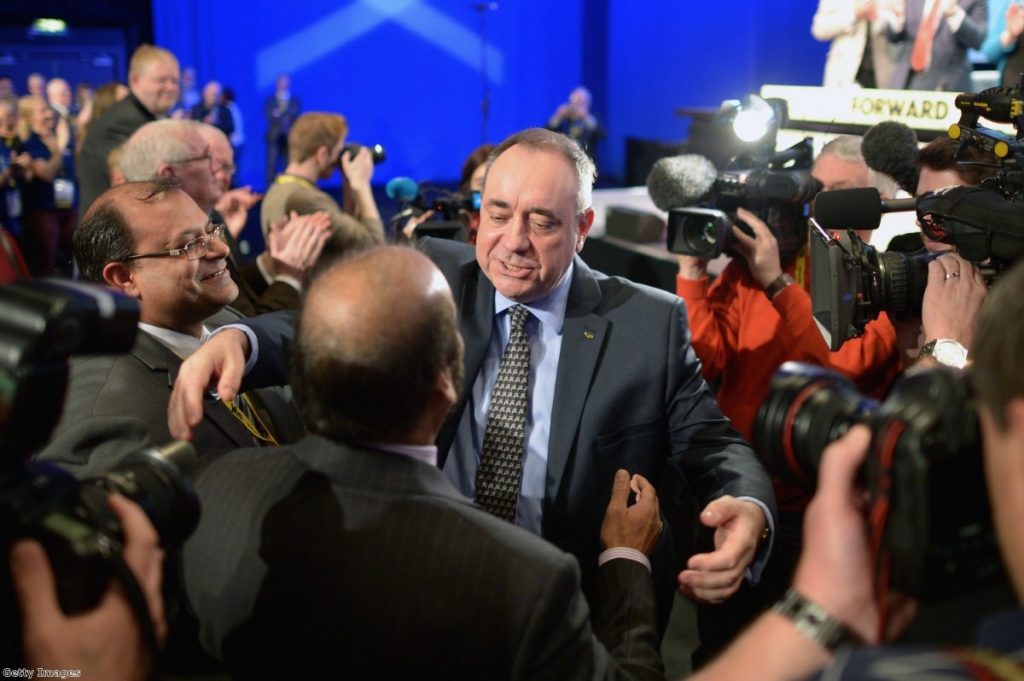Fears of disorder as Yes surges to record high in referendum poll
Police have warned of disorder and possible violence in the days ahead of the Scottish independence referendum, following a shock poll which put Alex Salmond within touching distance of victory.
The YouGov survey for the Sun put the pro-union lead at just six points when undecided voters had been excluded, down from the huge 22-point lead it enjoyed less than a month ago and the 14 points reported in mid-August.
YouGov is traditionally the pollster which most downplays the independence vote.
The poll finding follows a much-criticised series of adverts from Better Together. First the organisation put out a video broadcast of a housewife thinking about independence which was considered patronising and then it released billboard ads suggesting parents were voting 'No' because they loved their children.


It also follows what was widely perceived to be a problematic performance from Alistair Darling in the final TV debate, which may have given Salmond a vital springboard to victory.
The independence side also appears to have hit a rich vein in campaigning on risks to the NHS if Scotland stayed in the union and convinced many voters that Westminster is bluffing in its refusal to enter into currency union with Scotland.
The YouGov survey put the 'No' vote on 48% and the 'Yes' vote on 42%, with eight per cent undecided.
When undecided voters are excluded, the 'No' camp is on 53% and the 'Yes' camp is on 47%, the same result reported by a recent Survation survey.
The What Scotland Thinks website has 'No' on 55% and 'Yes' on 45%.
The poll will have a shock effect on Westminster, where most politicians had presumed they were cruising towards victory in Scotland.
It may convince many voters for the first time that independence is possible and bolster the nationalists ahead of the vote.
On the other hand, it could wipe out lingering traces of complacency among pro-union campaigners and help that side get its vote out.
The shock poll comes as police chiefs warn of disorder in the days leading up the referendum, as isolated moments of violence were reported on Saturday.
A 55-year-old man was charged in connection with an alleged assault on a woman following a "heated debate" between 'Yes' and 'No' supporters in Glasgow on Saturday.
Police are also investigating an allegation of assault following an incident outside Tynecastle stadium in Edinburgh, again on Saturday afternoon. Film footage appears to show members of opposing groups arguing after a group of men sang Rule Britannia.
Brian Docherty, chairman of the Scottish Police Federation, warned campaigners and politicians against using "intemperate, inflammatory and exaggerated language".
He said:
"The independence debate has been robust but overwhelmingly good-natured and it would prove a disservice to those who have participated in it thus far to suggest that with 17 days to go, Scotland is about to disintegrate into absolute carnage on the back of making the most important decision in the country's history.
"Politicians and supporters of whichever point of view need to be mindful of the potential impact of intemperate, inflammatory and exaggerated language, lest they be seen to seek to create a self-fulfilling prophecy."
The warning comes as Jim Murphy, former Scotland secretary, resumes his countrywide soapbox tour after warning the 'Yes' camp were organising street confrontations at his meetings. He was pelted with eggs in Kirkcaldy last Wednesday.
Meanwhile, Gordon Brown used a speech in Coatbridge on Monday night to warn that Scotland would be an "international outcast" if it refused to accept its share of UK debt after independence.

Salmond has threatened not to accept Scotland's share of the debt if Westminster refuses to enter into currency union, but financial experts have warned that would be seen as a default by the money markets. That would push up interest rates and the cost of borrowing.
The SNP points out that Westminster has already accepted liability for the whole of the UK's debt, in a bid to keep the markets calm during the referendum debate.
Brown said defaulting on the debt would suggest Scotland was on the "road to ruin" and that even Zimbabwe was honouring its international debt commitments.

